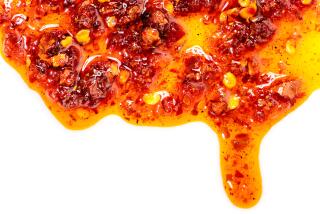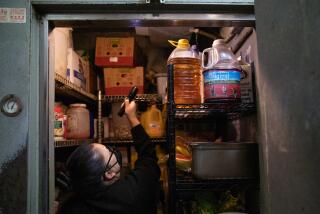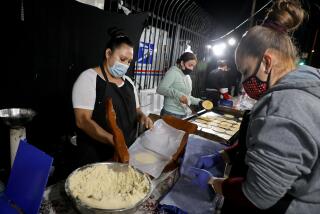Jury Gets an Issue to Sink Its Teeth Into : Trial: Verdict will determine whether a street food vendor can continue to slather chili and onions over his hot dogs.
- Share via
We put it to you, ladies and gentlemen of the jury: Are chili and onions condiments, or are they not?
On such points of law and lunch turns the verdict in the trial of a hot dog vendor charged with health code violations for ladling out chili and chopping fresh onions for his customers.
Case No. 90R13905, People vs. Michael Mikhail, went to the jury Tuesday after a weeklong misdemeanor trial conducted with as much solemnity--and expense--as for a murder; right down to a roster of witnesses who, in this case, spoke knowingly of retail food vehicles, approved commissaries and Mikhail’s Tasty Hasty Dogs.
The city attorney hauled Mikhail in from his Mid-Wilshire lunch route in June, after health inspectors observed him on several occasions chopping and grilling onions, slathering steaming chili on hot dogs, and leaving the lids off his containers during busy times.
At issue is whether such fixings--”to wit: chili (and) onions,” according to the official complaint--are potentially hazardous and illegal, because they were not prepackaged at an approved facility, are not on the list of unpackaged foods that may be sold from carts, and were not properly protected from possible contamination.
Said Deputy Public Defender Upinder Kalra: “The defense position is that chili is a condiment and not potentially hazardous at (a temperature of) 140 degrees.” Ditto for chopped onions.
“Hot dogs and onions go together,” he said in an impassioned closing argument. “They’re made to go together.” And chili? “We’re not talking about any chili, we’re talking about Mr. Mikhail’s chili.”
To illustrate his argument in court, Kalra ripped the foil from a sizzling hot dog smothered in onions and continued talking with the “evidence” in hand; the noon hour was approaching, and jurors’ heads followed his gestures as the scent wafted through the courtroom.
Health inspectors, he concluded, abused their discretion in enforcing a vague law.
Deputy City Atty. Jackie Mason insisted that the law protects consumers. It doesn’t matter, she told jurors, “if 1,000 people eat these hot dogs and don’t get sick; it’s the potential for food poisoning.” Opening and heating a can of chili, she said, is “not OK”; chili must be in sealed, serving-sized containers.
“It seems like we’re splitting hairs but we’re not,” she said, a bit apologetically. Like someone ticketed for speeding, Mikhail’s alleged violations are “fairly common,” she conceded later. “But a lot of people plead out or resolve the problem at an administrative hearing by the Health Department once they’re cited. It seldom goes this far.”
Mikhail, a 58-year-old Egyptian immigrant who saved up $5,000 to buy the cart four years ago, is a scrapper whose troubles with health inspectors date to 1987, when the same health inspector who testified against him last week fired the first volley.
Richard Wagner, head of the county Health Department’s division of food vehicle inspection, dumped bleach on Mikhail’s hot dogs, relish, chili, cheese and sauerkraut, a technique used to “denature” questionable food.
Ever since, Mikhail says, he has been a target. His cart, which he parks in front of the Paramount Building on Wilshire Boulevard--you can tell his from the others because it flies an American flag--has attracted a loyal following.
It has also attracted persistent health inspectors, unmoved by Mikhail shaking his copy of the state Health and Safety Code at them, or by the protests vendors have mounted against what they consider unfair policies.
He may have scored a point. Los Angeles Municipal Judge David S. Milton dismissed five of the original 11 charges against Mikhail last week after the court clerk, bailiff and reporter told the judge that a health inspector seated at the back of the courtroom was signaling answers to the inspector who was testifying.
If convicted of the remaining six garnish charges, Mikhail faces a maximum penalty of three years behind bars and a fine of $6,000.
Mikhail is optimistic. “When I win,” he said, “I will kiss the ground and fly a big American flag.” Selling and eating a hot dog, he said, is, well, an act of patriotism.
“The American people, they have pride in them. Italy has pizza. Japan has sushi. And we have the hot dog.”
More to Read
Sign up for Essential California
The most important California stories and recommendations in your inbox every morning.
You may occasionally receive promotional content from the Los Angeles Times.













